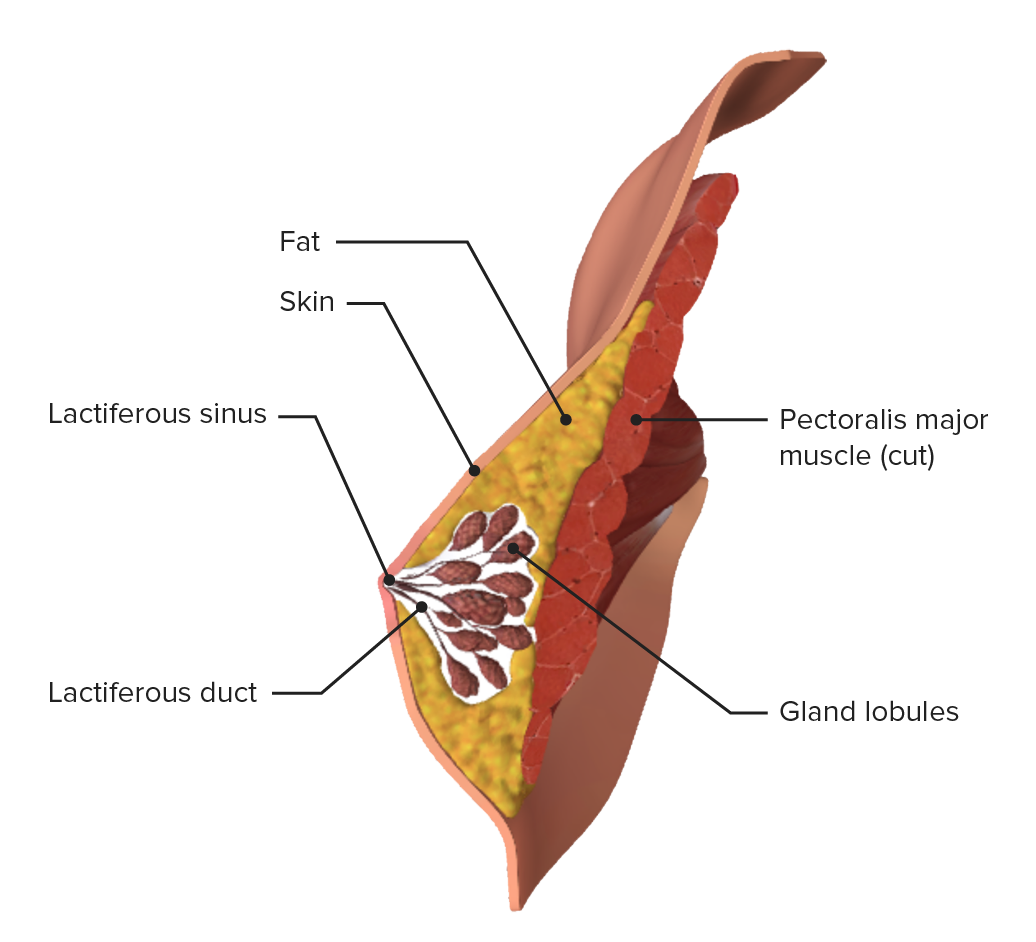Playlist
Show Playlist
Hide Playlist
Breastfeeding and Anticipatory Guidance for New Parents
-
Slides NewbornAnticipatoryGuidance Pediatrics.pdf
-
Download Lecture Overview
00:01 In this lecture, we will discuss anticipatory guidance for new parents. 00:07 So here’s a typical case, a 23-year-old mom, who doesn’t may be have too much parental support has just delivered her first baby. 00:15 She is excited, but she is really nervous because she doesn’t know how to be a parent. 00:20 What are the important things you should discuss with her while she is still in the hospital after delivery? This comes up a lot in pediatrics. 00:29 So one of the things we really like to talk about is breastfeeding and it’s important to understand all the benefits for breastfeeding that occur, both for the baby and for the mother. 00:41 So for the baby, breastfed babies have fewer infections. 00:44 They are less likely to get pneumonia, bronchiolitis and otitis media among others. 00:49 The reason is because the mother’s breast milk has antibodies against common infections already built into it. 00:56 Also, if the mother has the infection, which is common that both the mother and the baby would have the same infection the mother is making antibodies not only for herself but also for the baby. 01:07 Additionally for the baby, there is a higher bioavailability in breast milk of calcium, zinc and many other nutrients. 01:15 So it’s better to get it out of breast milk than it is out of formula. 01:19 Also, by breastfeeding, there is improved maternal/infant bonding. 01:23 That’s important. 01:25 Also, there is an improved infant response to vaccines when they’re breastfed. 01:29 There is a reduced risk of SIDS or sudden infant death syndrome and breastfed babies have fewer weight gain problems. 01:36 There are also benefits for the mother. 01:39 She will have a faster weight loss after being pregnant. 01:43 She will have faster constriction of her uterine muscle which will result in less leaking after her delivery. 01:50 She will have decreased risk of breast cancer and ovarian cancer in her life if she breastfed her children. 01:58 Breast milk is much cheaper than formula so she doesn’t have to pay for formula. 02:03 Also, basically, mother is going to have some time off from menstruation as a result of breastfeeding. 02:10 It is somewhat effective birth control. 02:13 I wouldn’t necessarily advertise that, but it is time off for menstruation and sometimes moms appreciate that. 02:19 Additionally, it’s easier than bottle feeding once the experience is there. 02:24 Bottle feeding is more work than breastfeeding once you know what you’re doing. 02:29 So is there a downside to breastfeeding? Most pediatricians would say, no there is not, always promote breastfeeding. 02:37 I agree with them, always promote breastfeeding but there a few very rare problems that breastfeeding can occur. 02:44 So for example one is in women who are a having hard time with milk coming in or hard time with a latch. 02:52 The baby may get dehydrated. 02:55 We have absolutely seen very rarely an infant coming in with a very high sodium level as a result of breastfeeding failure. 03:02 Parents should be aware of that and if it’s not going right, they should have someone they can call or somewhere they can go to get help with their breastfeeding. 03:10 Another one is sometimes breastfed babies are more likely to get jaundiced. 03:15 That’s not really a downside, the kids do fine and they get better but parents should be aware that there might be a prolonged or a renewed episode of jaundice in a baby who is breastfed. 03:27 Okay, let’s keep going about breastfeeding. 03:29 Breastfeeding is recommended because the benefits are so great and downsides are so rare. 03:36 It’s recommended over a formula in virtually all infants. 03:40 There are, however, a few contraindications for breastfeeding. 03:44 One is if mother is HIV positive and the baby is in a developed country like the United States, breastfeeding is not indicated. 03:53 Currently, if the mother is actively engaged in illegal drug use, we do not recommend breastfeeding because that baby is now being exposed to those drugs. 04:03 There are also some maternal medicines for example chemotherapy which would obviate the ability for the mother to breastfeed. 04:11 So how do you approach a mother about breastfeeding? First, have a breastfeeding policy in your hospital. 04:18 That improves likelihood of success in breastfeeding. 04:21 Establish breastfeeding as early as possible, within about 30 minutes of birth and allow infants to live with the mother in the hospital, not in a separate room. 04:31 Mother/infant skin to skin time is important. 04:35 This is very important. 04:36 Baby will stay warm, they will bond and breastfeeding is more successful. 04:41 In the hospitals, we should provide lactation consultants when needed to help mothers with problems. 04:47 And we should provide formula companies from giving free material to parents. 04:53 So how do you know if the infant is getting enough breast milk? How does the mother know if the baby is growing or not? The first is we should emphasize the role of colostrum. 05:03 It is expected in the first few days of this baby’s life that the baby will lose weight. 05:08 The baby was born with too much water on board anyway. 05:12 The baby was already effectively carrying a backpack of fluid, so that they may get by with just eating colostrum. 05:20 Colostrum is smaller in volume, so when the breastfeeding starts, it’s not particularly high in volume, but that material is incredibly valued and filled with antibodies. 05:31 So what we expect is the mother going to feel like not much is going on for the first day or two, but she should keep trying because on day three or four, the milk is going to come in. 05:41 Sometimes, women report feeling a rush or a feeling of warmth all over them and then the milk comes in, in power. 05:49 That’s classic and that's what we expect. 05:51 And that colostrum, although it’s lower in volume is very valuable. 05:55 So for the first two days, we don’t expect much from this baby. 06:00 The baby should have may be one to two wet diapers and really should have one to two stools a day. 06:05 That’s classic for a breastfed baby. 06:08 The infant should not lose more than 7% of birth weight. 06:12 So we allow a certain amount of weight loss but it shouldn’t be much more than that. 06:16 The infant should feed 8-12 times per day. 06:20 We’re talking at least every two to three hours. 06:23 If the infant’s going for a long time without feeding, that’s a problem and we should check that out. 06:28 Lastly, the infant should regain that birth weight within 14 days of life. 06:33 If not, we might have a problem.
About the Lecture
The lecture Breastfeeding and Anticipatory Guidance for New Parents by Brian Alverson, MD is from the course Neonatology (Newborn Medicine).
Included Quiz Questions
Which of the following is true about breastfeeding?
- There is very little breastmilk in the first few days of feeding.
- A baby should have 4 wet diapers each day in the first two days of life.
- A healthy infant may lose up to 12% of birth weight.
- An infant should be fed about 6 times in a day.
- An infant should regain birth weight by three weeks of age.
Which of the following is NOT considered an advantage of breastfeeding for mothers?
- Reduced risk of cardiovascular disease for the child
- Reduced cost
- Faster loss of "pregnancy" weight
- Improved bonding with baby
Which of the following neonatal conditions is most likely caused by breastfeeding?
- Jaundice
- Acrocyanosis
- Pallor
- Rash
- Central cyanosis
Customer reviews
5,0 of 5 stars
| 5 Stars |
|
2 |
| 4 Stars |
|
0 |
| 3 Stars |
|
0 |
| 2 Stars |
|
0 |
| 1 Star |
|
0 |
The essential information, well structured and presented. It will help me with the parents to provide better advice.
It's brief, concise and Dr. Alverson clearly explains the benefits of breastfeeding as well as give some problems to be aware of. Another thing that I liked was that he highlights the role skin to skin bond and the importance to start breast feeding as soon as possible even if the mother doesn't have much milk in the first hours.





